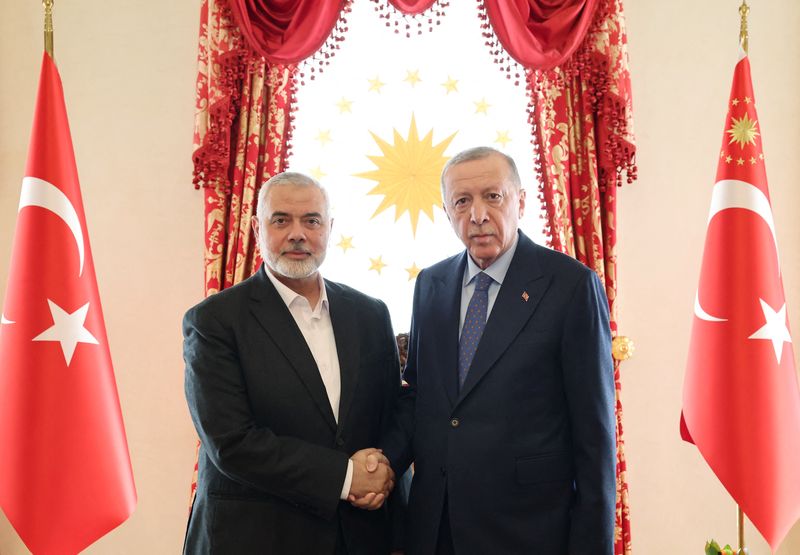ISTANBUL (Reuters) – Turkish President Tayyip Erdogan discussed efforts to deliver humanitarian aid to Gaza and reach a fair and lasting peace in the region during a meeting with Hamas leader Ismail Haniyeh in Istanbul on Saturday, his office said.
It was the first meeting between Erdogan and a Hamas delegation headed by Haniyeh since Israel began its military offensive in the Gaza Strip. Haniyeh’s visit to Turkey took place three days after he met Turkish Foreign Minister Hakan Fidan in Doha.
“Issues related to Israel’s attacks on lands of Palestine, particularly Gaza, efforts for adequate and uninterrupted delivery of humanitarian aid to Gaza, and a fair and lasting peace process in the region were discussed,” the Turkish presidency said in a statement.
The visit took place amid escalating regional tensions following Israel’s reported attack on Iran this week.
“Erdogan stressed that Israel should not benefit from the developments (between Iran and Israel) and that it is important to make efforts that will draw attention to Gaza again,” the statement added.
NATO member Turkey has denounced Israel’s offensive in Gaza following Hamas’ Oct. 7 attack on Israel and called for an immediate ceasefire.
Erdogan has called Hamas a “liberation movement” while slamming the West for what he calls its unconditional support of Israel. Ankara has also imposed trade restrictions on Israel.
In Saturday’s meeting, Erdogan told Haniyeh Turkey continues its diplomatic efforts for a permanent ceasefire as well as the establishment of an independent state of Palestine, according to the statement.
Erdogan also told Haniyeh “it is vital for Palestinians to act in unity,” the statement said.
Palestinian militant group Hamas seized control in Gaza in 2007, a year after sweeping elections, following a brief civil war with Palestinian Authority (PA) security forces, reducing the PA’s rule to the Israeli-occupied West Bank.
Efforts to reconcile the two sides have so far failed over thorny power-sharing issues.
(Reporting by Huseyin Hayatsever; Editing by Mark Heinrich and Helen Popper)
